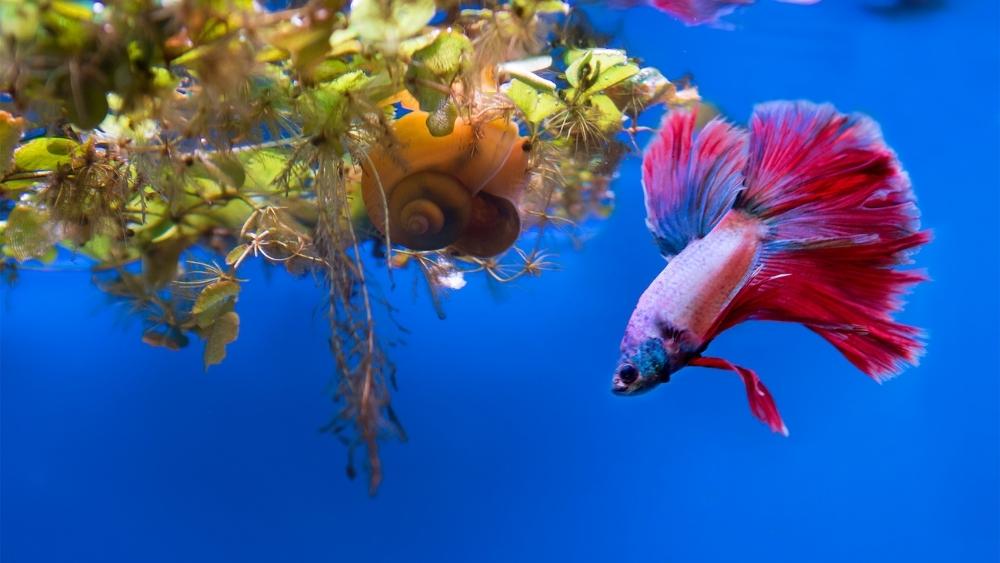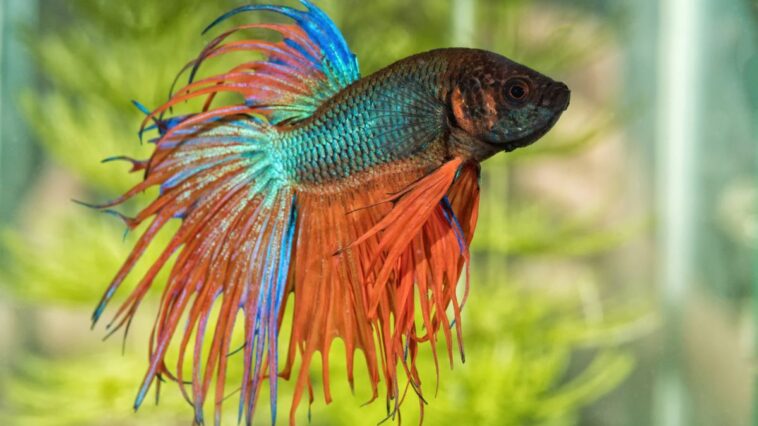Betta fish are one of the most popular and beautiful fish species in the aquarium hobby. With their vibrant colors and flowing fins, it’s no wonder they capture the hearts of many fish enthusiasts. But how long do Betta fish live? It’s a question that many first-time Betta owners often ask, and the answer is more complex than you might think.
So, let’s dive in and learn more about these fascinating fish! This comprehensive guide explores all the factors contributing to Betta Fish’s lifespan, including genetics, environment, and care. Whether you’re a seasoned Betta owner or just starting, this guide will provide you with all the information you need to give your Betta Fish the best chance of living a long and healthy life.
Factors that Affect Betta Fish Lifespan
The lifespan of a betta fish can vary depending on several factors. Here are some key factors that can influence the lifespan of a betta fish:
- Genetic factors: The genetics of the fish play a significant role in determining its overall health and lifespan. Some betta fish may be predisposed to certain health conditions or have weaker immune systems, affecting their lifespan.
- Water quality: Maintaining clean and optimal water conditions is crucial for the well-being of betta fish. Regular water changes, proper filtration, and appropriate water parameters (temperature, pH, ammonia, nitrite, and nitrate levels) are essential for their health. Poor water quality can lead to stress, diseases, and a shorter lifespan.
- Tank size: Providing a spacious and adequately sized tank is important for betta fish. In a small tank, bettas may become stressed due to limited swimming space, affecting their overall health and lifespan. A larger tank (at least 5 gallons) with ample hiding spots and plants can promote better physical and mental well-being.
- Diet and nutrition: Feeding a balanced and nutritious diet is crucial for the longevity of betta fish. A varied diet that includes high-quality betta pellets, frozen or live foods (such as brine shrimp or bloodworms), and occasional treats can provide essential nutrients and help prevent nutritional deficiencies.
- Stress levels can significantly impact a betta fish’s health and lifespan. Factors that can cause stress include inadequate tank conditions, aggressive tankmates, poor water quality, sudden temperature or water chemistry changes, and excessive handling. Minimizing stressors and providing a calm and stable environment can promote a longer lifespan.
- Disease prevention and treatment: Regular monitoring for signs of illness, prompt treatment of diseases or infections, and quarantining new fish before introducing them to an existing tank are essential practices to ensure the well-being and longevity of betta fish.
- Genetic diversity: Breeding betta fish with a focus on maintaining genetic diversity can help reduce the likelihood of inherited health issues. Inbreeding practices can lead to weaker immune systems and other genetic problems that can shorten the lifespan of bettas.
Remember, while these factors can influence the lifespan of a betta fish, individual care and attention are crucial. Providing proper care, a suitable environment, and meeting their specific needs can significantly contribute to a betta fish living longer and healthier.
The Average Lifespan of Betta Fish in Captivity

The average lifespan of Betta fish in captivity is around two to four years. However, this lifespan can be extended with proper care and attention. Betta fish that are kept in optimal conditions and receive proper care can live up to five or even six years. It’s important to note that the lifespan of Betta fish can be affected by various factors, such as genetics, environment, and quality of care. Therefore, it’s essential to provide the best possible care to extend the lifespan of Betta fish.
Signs of a Healthy Betta Fish
Here are some signs of a healthy betta fish:
- Active and alert: A healthy betta fish will be active, swimming around its tank and exploring its environment. It should respond to movement outside the tank and show curiosity about its surroundings.
- Good appetite: A healthy betta fish will have a healthy appetite and eagerly consume its food. It will show interest in the food, actively search for it, and consume it without difficulty.
- Vibrant colors: Bettas are known for their beautiful and vibrant colors. A healthy betta fish will have bright and well-defined colors. However, it’s important to note that bettas naturally have color variations, so changes in coloration over time can be normal.
- Fins and scales: The fins of a healthy betta fish should be intact, spread out, and not clamped together. The scales should be smooth and not appear discolored, raised, or rough. Any signs of torn or frayed fins, discoloration, or growths on the body could indicate health issues.
- Clear eyes: A healthy betta fish will have clear, bright eyes without cloudiness, swelling, or discharge. Cloudy or swollen eyes can be signs of infections or other health problems.
- Smooth breathing: The betta fish’s gills should move smoothly and evenly. Labored or irregular breathing, gasping at the water surface, or rapid gill movement can indicate respiratory issues or poor water quality.
- Healthy skin: The skin of a healthy betta fish should be smooth and free from lesions, sores, or abnormal growths. Signs of skin issues or infections may include redness, white spots, or any other noticeable abnormalities.
- Normal behavior: A healthy betta fish will exhibit normal behavior patterns. It should not show lethargy, excessive hiding, or unusual aggression. It will be curious, explore its surroundings, and interact with its environment.
Regular observation and familiarization with your betta fish’s usual behavior and appearance are essential for noticing any changes or signs of illness. If you notice any abnormalities or suspect that your betta fish may be unwell, it is recommended to consult a veterinarian experienced in fish health for proper diagnosis and treatment.
Common Health Issues that Affect Betta Fish Lifespan
Betta fish are susceptible to several health issues that can affect their lifespan if not properly addressed. Here are some common health issues that can impact betta fish:
- Fin rot: Fin rot is a bacterial infection that can cause the fins and tail of a betta fish to deteriorate. It is often a result of poor water conditions or injury. Fin rot can lead to further complications and even systemic infections if left untreated.
- Ich (White Spot Disease): Ichthyophthirius multifiliis, commonly known as ich, is a parasitic infection that causes small white spots to appear on the fish’s body and fins. If not treated promptly, it can lead to scratching, lethargy, loss of appetite, and respiratory distress.
- Velvet disease: Velvet disease is caused by the parasitic protozoan Piscinoodinium pillulare. It appears as a fine golden or rust-colored dust on the fish’s body, giving it a velvet-like appearance. Infected fish may exhibit rapid breathing, loss of appetite, and clamped fins.
- Dropsy: Dropsy is characterized by fluid accumulation within the betta fish’s body, leading to swelling and a “pinecone” appearance. It can be caused by bacterial infections or organ failure. Dropsy is often associated with poor water quality and is challenging to treat.
- Swim bladder disorder: Swim bladder disorder affects the swim bladder, an organ responsible for buoyancy control. Various factors, including overfeeding, constipation, or physical trauma, can cause it. Fish with swim bladder disorder may struggle to maintain balance, float uncontrollably, or sink to the bottom.
- Fungal infections: Fungal infections can occur when a betta fish’s immune system is weakened, usually due to stress, injuries, or poor water conditions. Fungal infections often appear as cotton-like growths on the fish’s body or fins.
Maintaining excellent water quality, providing a balanced diet, regular observation, and prompt treatment of any signs of an illness can significantly impact a betta fish’s lifespan and overall well-being. Prevention and early detection are essential for addressing these health issues. Consulting a veterinarian experienced in fish health is recommended if you suspect your betta fish may suffer from a health issue.
How to Care for Aging Betta Fish
Caring for an aging betta fish requires adjustments and special attention to ensure their comfort and well-being. Here are some tips for caring for an aging betta fish:
- Tank setup: Consider providing a smaller, shallower tank for your aging betta fish. A tank with a reduced water depth makes it easier for them to reach the surface for air and reduces the distance they have to swim. Ensure the tank has gentle filtration to minimize water flow, as older bettas may struggle with strong currents.
- Water quality: Maintain excellent water quality to support the health of your aging betta fish. Perform regular water changes, remove any uneaten food promptly, and monitor water parameters such as temperature, pH, and ammonia levels. Aging bettas may be more sensitive to changes in water conditions, so stability is crucial.
- Diet: Adjust the diet of your aging betta fish to meet their changing nutritional needs. Consider providing a high-quality, easily digestible food specifically formulated for senior fish. You can supplement their diet with small, soft, and easily manageable food options like soaked pellets or frozen foods.
- Feeding routine: Older bettas may have decreased appetite or slower digestion. Pay attention to their eating habits and adjust the feeding routine accordingly. Offer smaller, more frequent meals to ensure they are getting adequate nutrition without overfeeding.
- Water temperature: Maintain a stable and appropriate water temperature for your aging betta fish. The optimal range for bettas is around 78-82°F (25-28°C). Keep the temperature consistent, as sudden temperature fluctuations can stress them.
- Gentle handling: Older bettas may be more fragile, so handle them with extra care. When performing tank maintenance or transferring them to a different container, use a soft net and be gentle to avoid causing stress or injury.
- Enrichment and stimulation: Provide your aging betta fish with a comfortable and enriched environment. Include soft, broad-leaved plants or resting spots near the surface for easy access to rest and breathe. Avoid sharp or rough decorations that could injure their delicate fins.
- Observation and monitoring: Pay close attention to your aging betta fish and monitor their behavior, appetite, and overall health. Look for signs of stress, discomfort, or illness, such as changes in swimming patterns, loss of appetite, lethargy, or physical abnormalities. Consult a veterinarian experienced in fish health if you notice any concerning signs.
Providing a comfortable and stress-free environment, proper nutrition, and regular monitoring can help ensure the best possible care for your aging betta fish. Remember, each betta fish is unique, and their needs may vary. Their care should be adjusted based on their condition and behavior.
Conclusion and Final Thoughts
In conclusion, Betta fish are beautiful and fascinating creatures that can provide years of enjoyment to their owners. Understanding the factors contributing to Betta fish’s lifespan, including genetics, environment, and care, is essential for providing the best possible care and extending their lifespan.
With proper care and attention, Betta fish can live long and healthy lives, bringing joy and beauty to any aquarium. Providing a clean and well-maintained tank, an appropriate diet, and avoiding overcrowding and aggressive tank mates can help ensure the longevity of Betta fish. It’s also important to keep a close eye on the health and behavior of Betta fish and address any issues promptly.




